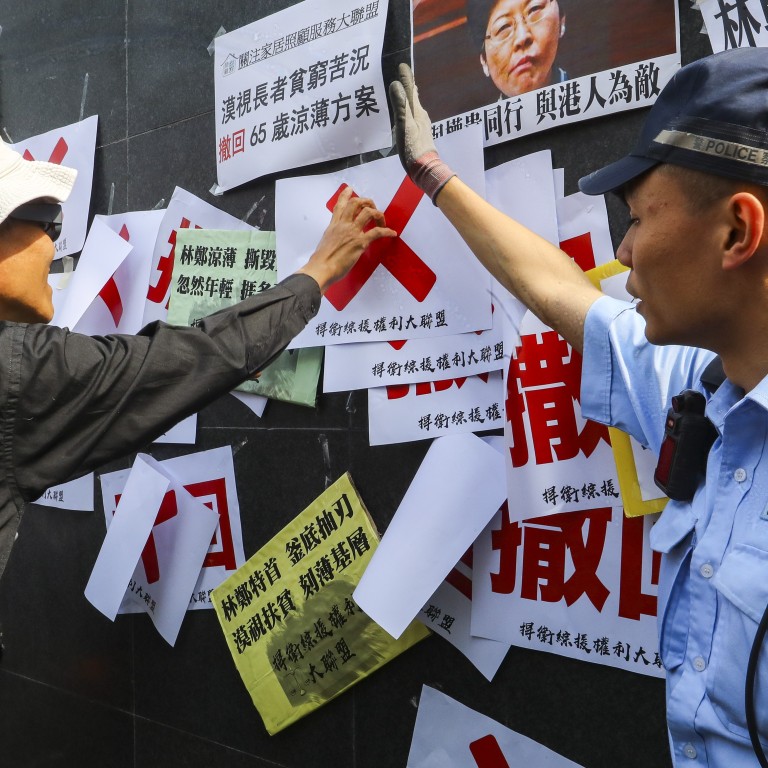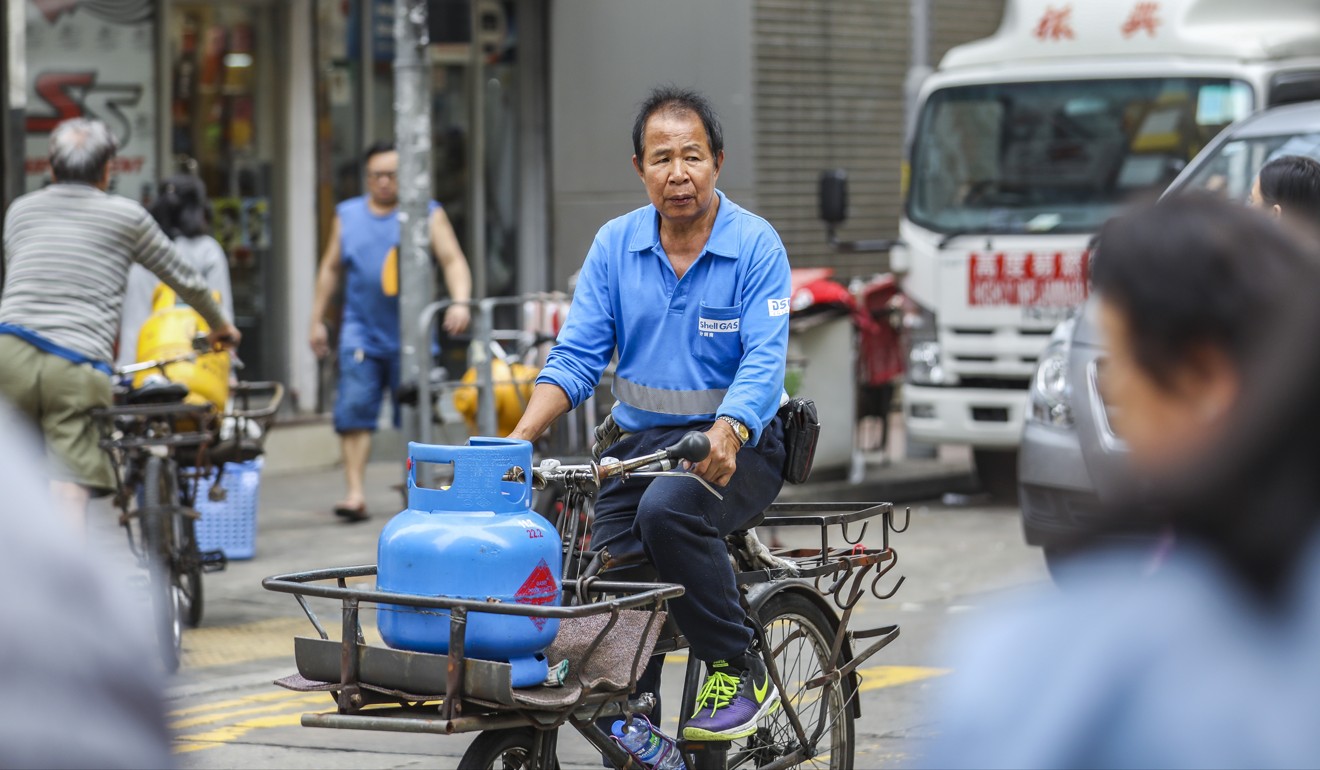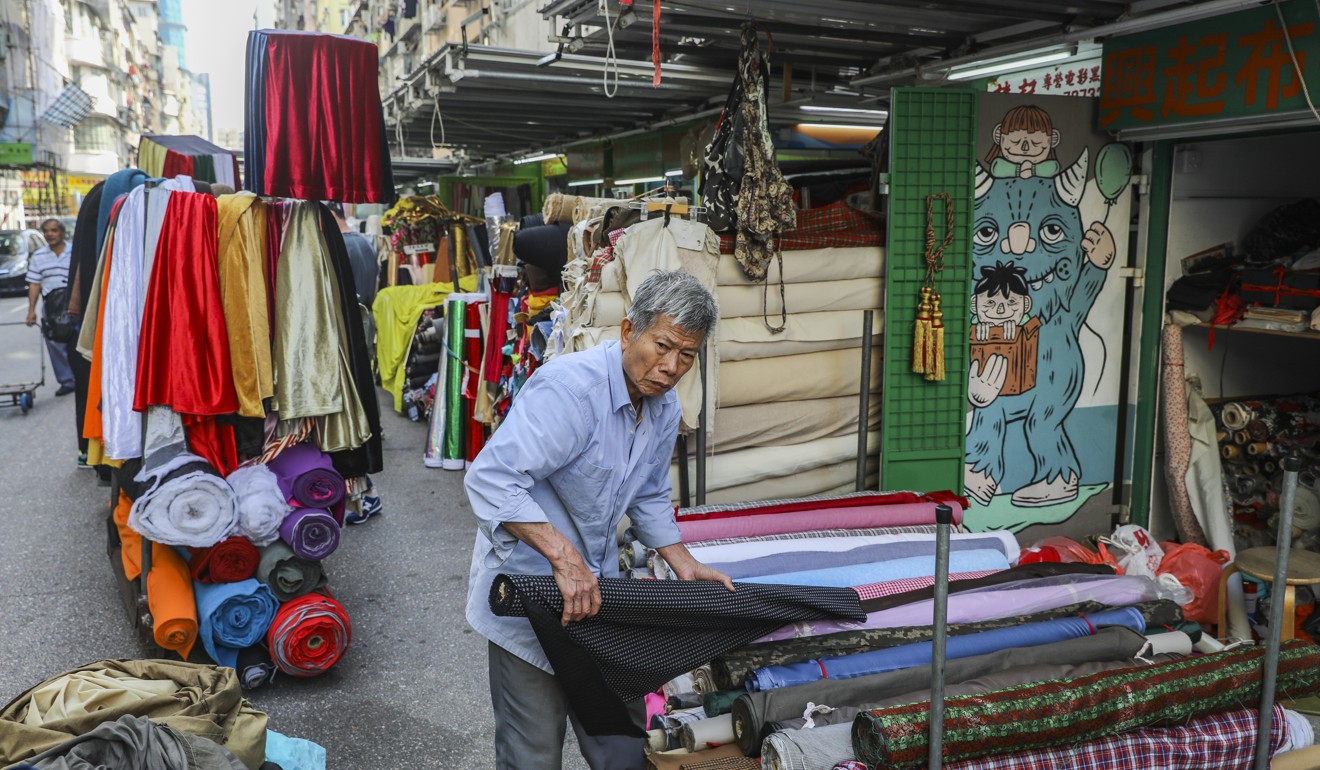
Protesters decry Hong Kong government’s plan to raise CSSA elderly payment threshold to 65
- Welfare recipients and activist groups say the shortfall in payments for people aged 60 to 64 will have a serious impact on livelihoods
- Lawmakers also call on the government to reverse decision or at least consider alternative measures
Around three years ago, a partial loss of hearing and blurred vision from decades of labour in renovation works rendered 59-year-old Tang unable to continue with his job.
Tang, who preferred to only give his surname, had no choice but to apply for the comprehensive social security assistance (CSSA) scheme, which is intended to only help meet basic needs.
With only HK$2,455 (US$313) a month in government payments from the scheme and no family in Hong Kong, he was struggling to find a proper place to live with rents in the city skyrocketing. Fortunately, he was able to get a place in a hostel for single people provided by the Home Affairs Department, which supports those living in dilapidated conditions up to 60 years old.
With Tang just eight months shy of 60, he was already prepared to move into a subdivided flat after he starts getting the elderly rate for the CSSA scheme, which is HK$1,030 more a month.
Having to live in poor conditions in subdivided flats in the future, it may seem he was already prepared for the worst, but he was given a rude shock when officials announced on Monday that they were raising the lower age limit on the elderly CSSA from 60 to 65 years old starting next month.

“I felt like I had fallen into a cold river,” Tang said.
Under the new arrangement, people aged 60 to 64 will only be able to get adult rates for CSSA payments. This means Tang has to wait five more years to get the additional H$1,030 a month.
The controversial policy change sparked a public outcry this week, with legislators across the political spectrum calling on Chief Executive Carrie Lam Cheng Yuet-ngor to halt the move.
But the city’s leader, who is herself 61, said the change could not be reversed, adding that the adjustment was reasonable in view of the city’s improved life expectancy and the global trend of people working past 60, citing herself as an example.
Latest minimum wage increase will benefit fewer workers than initially thought
However, Tang said the reality was different, as he had only managed to get one job offer after applying for more than 10 in the last three years. Even that one job he was let go from after just two days.
“I worked as a security guard, but had difficulties hearing the pager due to my hearing problems,” he said.
While he was willing to take on any job, including cleaning or collecting cardboard, he was not confident of getting one with his health condition.
Tang’s desperation prompted him to take to the streets on Saturday to urge Lam to take back the unpopular decision to raise the age limit. Around 100 protesters, including elderly citizens and around 20 pressure groups, chanted slogans and put up posters outside the Chief Executive’s Office in Admiralty.

Au Yeung Tat-chor, a spokesman for CSSA Rights Defence, said that the alliance knows of many people like Tang who have health problems and hence cannot take on physically strenuous jobs.
Chairman of the government’s Elderly Commission Lam Ching-choi said the commission was willing to discuss the policy change with stakeholders if the government was OK with it.
Lawmaker Priscilla Leung Mei-fun of the Business and Professionals Alliance for Hong Kong said she had raised a suggestion to use the Community Care Fund to make up for the difference in government payments, estimated at HK$20 million per year, for the 60 to 64 age bracket for the next five years. She said the government had indicated it was willing to consider the proposal.
Wake up to the crazy rich-poor divide in Hong Kong
But Neighbourhood and Workers Service Centre lawmaker Leung Yiu-chung was against the measure, saying it was a move backward in the principle of Hong Kong’s social welfare system, stressing the halt in the change was necessary. The social welfare sector also took the opportunity during a budget consultation session on Saturday to tell finance minister Paul Chan Mo-po and Secretary for Labour and Welfare Law Chi-kwong of their dissatisfaction with the government’s decision.
According to Roy Kwong Chun-yu, chairman of the Legislative Council’s panel on welfare services, about 25,000 people between 60 and 64 are currently on the elderly CSSA. He added that it would only cost about HK$100 million a year to maintain the existing arrangement.

